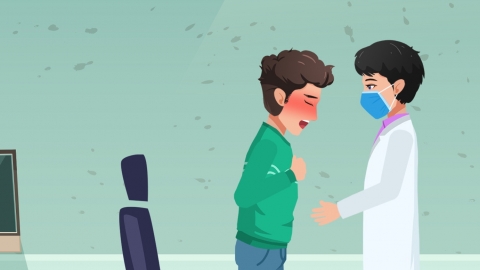What should I do if there is phlegm in my throat?
Generally speaking, the throat refers to the pharynx. Phlegm in the throat may be caused by environmental irritation, dietary factors, rhinitis, chronic pharyngitis, chronic bronchitis, and other conditions. Treatment options, such as general therapy and medication, can be used under the guidance of a doctor. If discomfort occurs, prompt medical attention is recommended. The specific analysis is as follows:

1. Environmental Irritation
Phlegm in the throat may be caused by environmental irritation. Pollutants, smoke, or cold air in the atmosphere can irritate the respiratory tract, leading to increased secretions and the formation of phlegm. In daily life, prolonged exposure to heavily polluted environments should be avoided, and wearing a mask can help reduce the inhalation of harmful substances.
2. Dietary Factors
Spicy, greasy, or sweet foods may irritate the throat and lead to increased phlegm production. It is recommended to maintain a balanced diet, reduce the intake of spicy and greasy foods, and moderately increase the proportion of fresh vegetables and fruits.
3. Rhinitis
Rhinitis may be triggered by a combination of viral or bacterial infections, allergen exposure, nasal structural abnormalities, and long-term contact with chemicals or smoke. Inflammation can lead to excessive mucus production, which flows into the pharynx, causing a sensation of phlegm in the throat. It may also be accompanied by symptoms such as sneezing and runny nose. Patients may follow medical advice to use medications such as Loratadine Tablets, Mometasone Furoate Nasal Spray, and Montelukast Sodium Chewable Tablets for treatment.
4. Chronic Pharyngitis
Chronic pharyngitis is often caused by recurrent episodes of acute pharyngitis, long-term smoking and alcohol consumption, and other factors. The throat remains in a state of chronic inflammation, with submucosal tissue hyperplasia and thickening, and dysfunction of mucous gland secretion, resulting in increased volume and viscosity of mucus. Additionally, inflammation impairs the ciliary movement function of the mucosal epithelium, making it difficult to expel phlegm effectively, leading to a persistent sensation of phlegm in the throat. Symptoms such as nausea and dry vomiting may also occur. Medications such as Yinhuang Tablets, Pharyngitis Tablets, and Pudilan Xiaoyan Oral Liquid may be used under medical guidance for treatment.
5. Chronic Bronchitis
Chronic bronchitis is often triggered by long-term factors such as smoking, air pollution, and repeated viral or bacterial infections. Long-standing inflammation in the bronchi causes hyperplasia and hypertrophy of goblet cells and mucous glands in the bronchial mucosa, leading to excessive mucus secretion. During the upward expulsion of this mucus, some accumulates in the throat area. Due to its high viscosity and the possible impairment of ciliary movement caused by bronchial inflammation, the phlegm becomes difficult to cough out, resulting in a persistent sensation of phlegm in the throat. Symptoms such as wheezing and shortness of breath may also occur. Medications such as Ambroxol Hydrochloride Tablets, Azithromycin Tablets, and Guilong Kechuanning Capsules should be used under medical guidance to alleviate symptoms.
In daily life, maintaining a routine of going to bed early and waking up early is recommended, along with consuming more fruits and vegetables to enhance overall immunity.







